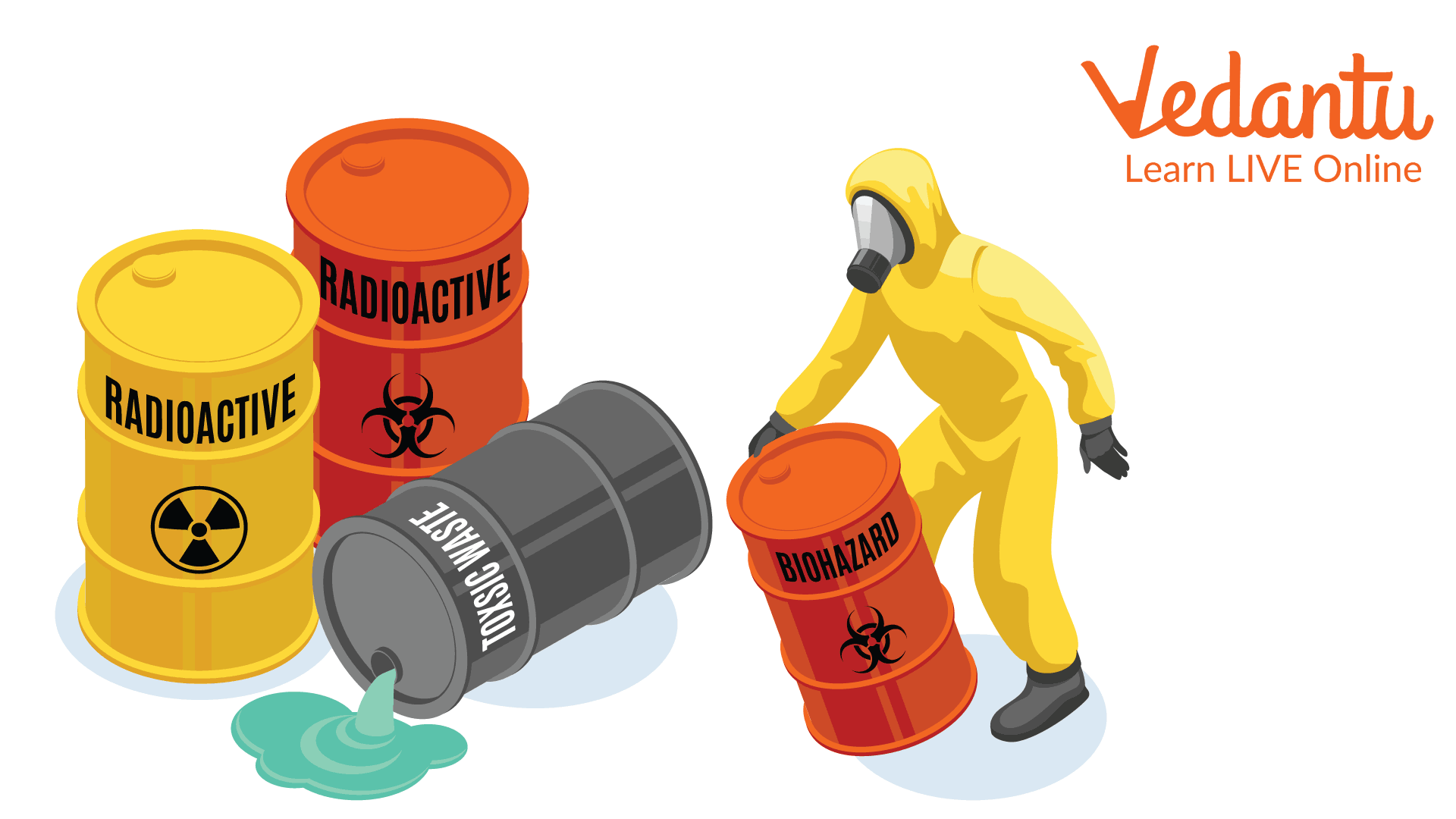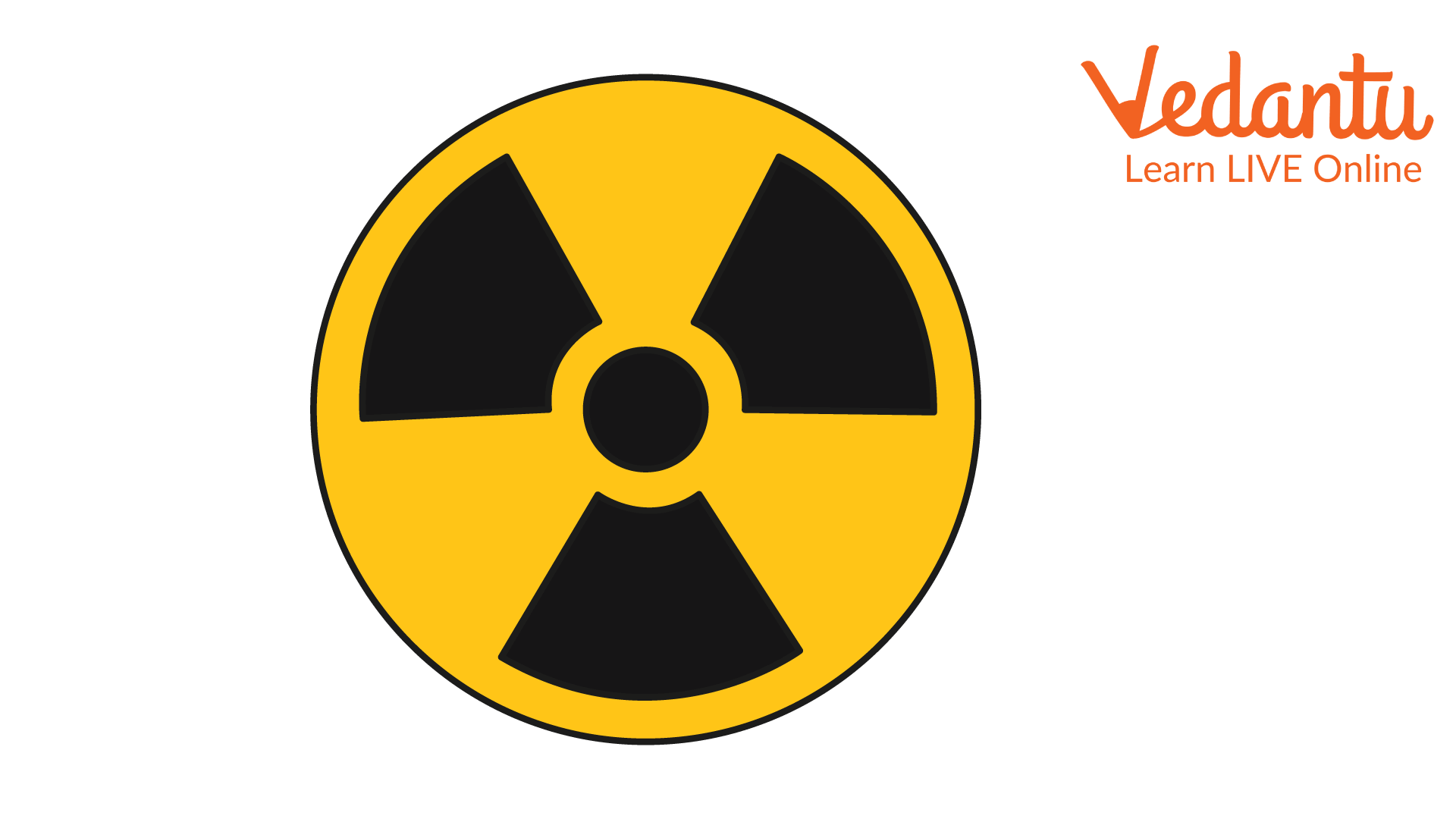




How Does Radioactivity Impact Medicine, Industry, and Research?
The act of radiation spontaneously emitting without an external trigger is known as radioactivity. This is performed by an unstable atomic nucleus that wants to give up some energy in order to shift its configuration to a more stable one. In simple terms, The particles that nuclei release as a result of nuclear instability are referred to as radioactive particles.Although radioactivity has always been on Earth, it was not until 1896 as it was discovered later by scientists.The Earth's core would have frozen billions of years ago without the heat provided by naturally occurring radiation.

Radioactive Waste
Uses of Radioactivity
In addition to being utilised to produce power, radiation is also used in the education industry and medicine. Radiation is also helpful in many other fields, including mining, space exploration, agriculture, and archaeology. The uses of radioactive elements are as follows:
Uses of Radioactive in Medicine- To identify, analyse, and treat a wide range of human metabolic activities and medical disorders, hospitals, physicians, and dentists use nuclear tools and techniques. Radiation-based medical methods have helped to diagnose and cure diseases like bone cancer and thyroid, saving thousands of lives.
Applications in the Academics and Sciences- Nuclear materials are used in academic coursework, laboratory demonstrations, experimental research, and various health physics applications at universities, colleges, high schools, and other educational and scientific institutions. We now know more about the kinds of different soil plants require, the size of recently discovered oil fields, and the paths of ocean currents owing to radiation.
Commercial Uses- Foods, medical devices, and other items are exposed to radiation (such as x-rays) during radioactivity to kill bacteria without damaging the item being disinfected or turning it hazardous. Toxic pollutants, such as exhaust gases from coal-fired power plants and industry, are removed with radiation.
Nuclear Power Facilities- One of the most effective ways to use radiation is to divide atoms and create electricity. We want a reliable, sufficient, healthy, and reasonably priced source of electricity as our nation moves toward being a nation of electricity users. Uranium is a radioactive material which is used as fuel in nuclear power reactors.

Radioactive Icon
Industrial Use of Radioactive Isotopes
Manufacturers utilise radioisotopes as detectors to track fluid flow and filtration, find leaks, measure engine wear, and detect rust in process equipment.
It is easy to examine the mixing and flow rates of a wide range of materials, including liquids, powders, and gases, and identify leaks by introducing tiny amounts of radioactive chemicals to different operations.
In the industrial setting, radiotracers are frequently used to examine operations and identify the root causes of inefficiency. Radiotracers are also employed in the oil and gas sector to estimate the size of oil fields.
Uses of Radioactivity in Agriculture
Radiation and radioisotopes are also used in agriculture to study trace element nutrition, photosynthesis, and plant protection. It includes pesticide action, fertiliser intake, and ionic mobility in soils and plants. They are also used to preserve food.
Researchers now have the opportunity to describe occurrences that were once confusing about plant nutrition, growth, and the emergence of new types because of radioisotopes and radiation.
They assist us in determining the root causes of the many negative effects on plants. As a result, radioisotopes have emerged as a crucial tool for scientists working to solve agricultural issues.
Conclusion
The process of radioactivity is the random split of particles or the release of energy from a substance or product. High radiation levels are used to destroy hazardous microorganisms in food and increase the food's shelf life. In nuclear power reactors, radioactivity generates heat to produce electricity. In medicine, it is used to treat diseases like cancer. It is even used in agriculture to detect the process of photosynthesis and trace the nutrients in the plants. Also, read radioactivity facts
FAQs on Uses of Radioactivity: Everyday Applications and Benefits
1. What are the most common uses of radioactivity across different fields?
Radioactivity has several important applications that benefit society. The most common uses are found in:
- Medicine: For diagnosing and treating diseases. For example, radioactive isotopes are used as tracers to detect tumours and in radiotherapy to kill cancer cells.
- Energy Production: Nuclear power plants use nuclear fission, a process involving radioactive elements like Uranium, to generate large amounts of electricity.
- Industrial Applications: Used in smoke detectors, for sterilising medical equipment, and in gauging the thickness of materials like paper and metal sheets.
- Agriculture: To create new plant varieties with desirable traits, control insect pests, and extend the shelf life of food through irradiation.
- Archaeology and Geology: Carbon-14 dating is a well-known technique that uses the decay of radioactive carbon to determine the age of ancient organic materials and fossils.
2. How is radioactivity specifically applied in the medical field for diagnosis and treatment?
In medicine, radioactivity is a crucial tool. For diagnosis, radioactive isotopes (radiotracers) like Iodine-131 are introduced into the body. Their movement can be tracked to study organ function, such as the thyroid gland, or to locate blockages and tumours. For treatment, high-energy radiation from isotopes like Cobalt-60 is used in radiotherapy. This radiation is precisely aimed at cancerous tumours to destroy them while minimising damage to surrounding healthy tissue.
3. What is the role of radioactivity in agriculture and food preservation?
Radioactivity plays a significant role in modern agriculture. It is used to induce mutations in seeds to develop new crop varieties that might be more resistant to disease or have higher yields. Furthermore, radiation is used for pest control through the Sterile Insect Technique (SIT), where male insects are sterilised before being released, thus reducing the pest population. For food preservation, irradiation with gamma rays can kill bacteria, moulds, and insects, thereby extending the shelf life of produce without making it radioactive.
4. How does carbon dating work to determine the age of ancient objects?
Carbon dating is a method used to determine the age of organic materials. All living organisms absorb carbon, including a small, constant amount of radioactive Carbon-14. When an organism dies, it stops absorbing carbon. The Carbon-14 it contains begins to decay at a known, constant rate (its half-life). By measuring the amount of remaining Carbon-14 in a fossil or artefact and comparing it to the amount in living organisms, scientists can precisely calculate how long ago the organism died.
5. What is the fundamental difference between using radioactivity for energy (nuclear power) versus in a bomb?
The key difference lies in the control of the chain reaction. In a nuclear power plant, the fission of radioactive fuel (like Uranium-235) is carefully controlled. Control rods are used to absorb excess neutrons, ensuring the reaction proceeds at a steady, sustained rate to produce heat for electricity. In a nuclear bomb, the chain reaction is deliberately left uncontrolled, causing it to escalate exponentially in a fraction of a second, releasing a massive amount of energy all at once.
6. Why are the beneficial uses of radioactivity often associated with significant health and environmental risks?
The same energy that makes radioactivity useful can also be harmful. The radiation emitted (alpha, beta, gamma) is a form of ionising radiation, meaning it has enough energy to knock electrons out of atoms and molecules in living cells. This can damage DNA, leading to mutations, cancer, or cell death. Therefore, while radioactivity can kill cancer cells, uncontrolled or improper exposure can also cause cancer. The disposal of radioactive waste from power plants and hospitals is also a major challenge, as it remains hazardous for thousands of years, posing a long-term environmental risk if not managed correctly.
7. What are the main types of radiation, and how do their properties affect their uses?
The three main types of radiation from radioactive decay have different properties, which determine their use:
- Alpha (α) particles: These are heavy and have low penetrating power; they can be stopped by a sheet of paper or skin. Because they are not very penetrating, their primary use is in applications like smoke detectors.
- Beta (β) particles: These are lighter than alpha particles and have medium penetrating power. They can pass through paper but are stopped by a thin sheet of aluminium. This property is useful for measuring the thickness of materials like paper or plastic.
- Gamma (γ) rays: These are high-energy electromagnetic waves with very high penetrating power, requiring thick lead or concrete to be stopped. This powerful penetration makes them ideal for radiotherapy to treat internal tumours and for sterilising medical equipment.









